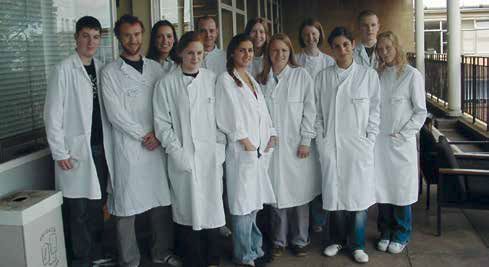
Physiology News Magazine
In vivo short courses: Giving students first-hand experience and knowledge
News and Views
In vivo short courses: Giving students first-hand experience and knowledge
News and Views
Mike Collis
Richard Apps
University of Bristol
https://doi.org/10.36866/pn.90.11
Physiologists and pharmacologists need to understand the appropriate use of animals in research and those who can perform in vivo experiments are essential in many areas of biological research. In vivo skills are needed in government and academic research labs that investigate basic physiology, ageing, diseases and their treatments. Such skills are essential for the translation of genomic information into functional significance, particularly for researchers using transgenic animals. They are also needed for drug discovery and development in both the pharmaceutical and biotechnology industries. However, the opportunity for students of the biological sciences to learn about and experience in vivo experiments in the UK is severely limited, primarily by the high cost (in both money and time). In response to this, The British Pharmacological Society (BPS) and The Physiological Society introduced short, one week, in vivo courses in 2001. These courses were to provide an intensive in vivo research training experience for undergraduates and postgraduates from the UK and ROI, particularly when their home institution could not provide this. Since their introduction, the courses have proved extremely popular with both undergraduate and postgraduate students and are consistently oversubscribed. As of 2011, students from 42 different universities have attended them.
In vivo courses are expensive to run and they require a high staff to student ratio. The short courses cost about £2000 per student, which also includes the costs of student travel and accommodation. This is much more than universities can afford and consequently the courses have been funded by the two societies, industry, the Biotechnology and Biosciences Research Council (BBSRC) and the Wellcome Trust. In 2013, the Medical Research Council (MRC) joined the funding group, reinforcing the increasing recognition of the importance of providing these courses and of offering students an understanding of in vivo research.
Each course has two components: a Home Office training course during the Easter vacation and an experimental course during the summer vacation. Students attending the courses can therefore apply for a Home Office personal licence to allow them to participate in animal experiments. However, the courses are not primarily about gaining manual skills. They are designed to teach the students to understand when it is essential to use an animal in an experiment and when it is not. The ethics of animal experimentation are discussed and there is a strong emphasis on the application of the 3 Rs (Replacement, Reduction and Refinement of animal experiments). All in vivo experiments should be appropriately designed so that the data obtained is statistically valid and these aspects are also an important part of the courses. Finally the students have hands-on experience of participating in in vivo experiments and the subsequent analysis of the data obtained, providing them with a valuable insight into the practical issues and biological variability inherent in whole animal research.
Three courses were originally offered: at Kings College London, University of Bristol and University of Glasgow. In 2013 this number increased with additional new courses at University of Glasgow and Strathclyde University. The five short courses which are now offered have many features in common and illustrate how in vivo experiments are important in cardiovascular biology (Glasgow, Bristol, Kings), inflammation (Strathclyde), nociception (Kings) and neuroscience research (Bristol, Glasgow).
Applications to attend the courses are invited each autumn via The Physiological Society and BPS websites and are considered on a competitive basis. Applicants do not need to be a Member of either society to apply for the courses, although we hope that attendees will join if they are not already a Member.
The value of the courses is best illustrated by the feedback from the attendees, the majority (~70%) of whom have gone on to use their in vivo skills in further research.
“The course was highly influential in my career path. It provided me with highly sought after skills and an insight into a side of medical science few undergraduates get to see. Without the course, it may have been the case that I wouldn’t have been offered two PhD in vivo studentships.”
“This course has been one of the most influential aspects that has made me driven to pursue a career in science. I loved the whole experience, and the first class teaching from our supervisor will ensure in vivo work remains a high priority in the minds of all those who attended the course.”
“The course broadened my understanding of in vivo research. It also allowed me to complete an in vivo dissertation project which gave me some excellent in vivo research experience. Following the course and my dissertation experience, I have become increasingly aware of the power of in vivo research in furthering our scientific understanding; and would definitely consider future work within this avenue should it be applicable to my line of research.”
“In an ideal world, all students would have the chance to take part in a course like this. It is exactly what is needed for students to decide to stay in research.”
“I gained a much better understanding of what is involved in in vivo work and the arguments for and against.”

